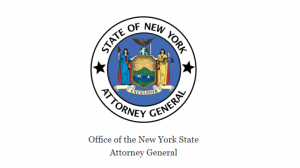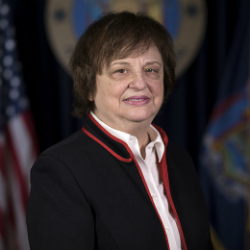

“New Yorkers deserve basic transparency and accountability when they invest – whether on the New York Stock Exchange or on a cryptocurrency platform. Yet, as our report details, many virtual currency platforms lack the necessary policies and procedures to ensure the fairness, integrity, and security of their exchanges,” said Attorney General Underwood. “With this report, we hope to give New Yorkers the tools they need to make educated decisions on whether to entrust their money to a cryptocurrency platform and to help protect themselves against theft, fraud, and abuse.”
Virtual Markets Integrity Report
The VMI Report is now available, along with a user-friendly interactive website. It presents:
- information collected by the Attorney General’s office from 10 virtual asset trading platforms based in the United States and abroad
- the conclusions reached by the Attorney General’s office about the state of the virtual trading markets as a whole.
The report reflects responses from the following platforms:
- Bitfinex (operated by iFinex Inc.)
- bitFlyer USA
- Bitstamp
- Bittrex
- Coinbase
- Gemini Trust Company
- HBUS
- itBit (operated by Paxos Trust Company)
- Poloniex (owned by Circle Internet Financial Limited)
- Tidex (operated by Elite Way Developments LLP).
Four platforms originally contacted – Binance Limited, Gate.io (operated by Gate Technology Incorporated), Huobi Global Limited, and Kraken (operated by Payward, Inc.) – claimed they did not allow trading from New York and declined to participate. The Attorney General’s office investigated those claims.
It found that Binance, Gate.io, and Kraken all accepted trades from within New York State. As such, the office referred Binance, Gate.io, and Kraken to the New York State Department of Financial Services (DFS) for potentially operating in New York State without seeking or receiving approval from DFS to engage in a virtual currency business activity and for possibly operating unlawfully in New York.
VMI report background
In April 2018, the Attorney General’s office sent letters to thirteen major virtual currency trading platforms requesting key information on their operations, internal controls and safeguards to protect customer assets. The Virtual Markets Integrity Initiative sought to:
- increase the transparency and accountability of platforms that retail investors rely on to trade virtual currency
- inform enforcement agencies, investors and consumers.
The Attorney General’s office asked the platforms to disclose information on six major topics, including:
- ownership and control
- basic operation and fees
- trading policies and procedures
- outages and other suspensions of trading
- internal controls
- privacy and money laundering.
In particular, the Attorney General’s office asked the platforms to describe their:
- approach to combating suspicious trading and market manipulation
- policies on the operation of bots
- limitations on the use of and access to non-public trading information
- safeguards to protect customer funds from theft, fraud, and other risks.
VMI Report key findings
The Report details how virtual asset trading platforms vary significantly in how they:
- respond to the risks facing virtual markets
- fulfil their responsibilities to customers.
From this the Report identified three broad areas of concern for the virtual markets as a whole:
- lack of protection from abusive trading practices
- pervasive conflicts of interest
- limited protection of customer funds.
In the latter instance:
- generally accepted methods for auditing virtual assets do not exist
- trading platforms lack a consistent and transparent approach to independently auditing the virtual currency purportedly in their possession
- several do not claim to do any independent auditing of their virtual currency holdings at all.
Taken together these areas of concern make it difficult or impossible to confirm whether or not platforms are responsibly holding their customers’ virtual assets as claimed. Furthermore, if a hack or unauthorized withdrawal occurs, customers are exposed. There is no public protection (like FDIC insurance) to cover virtual currency losses and there are serious questions about the scope and sufficiency of the commercial insurance that some platforms carry to cover those losses. Some platforms do not even insure against virtual asset losses.
Questions customers should ask of platforms
The Report identifies several fundamental areas for customers to understand before they think of trading on a virtual currency trading platform. In particular, the Report cautions customers to be wary of any platform that cannot, or will not, answer the following seven questions:
- What security measures are in place to stop hackers from unlawfully accessing the platform or particular customer accounts?
- What insurance or other policies are in place to make customers whole in event of a theft of virtual or fiat currency?
- What guardrails or other policies does the platform maintain to ensure fairness for retail investors in trading against professionals?
- What controls does the platform maintain to keep unauthorized or abusive traders off the venue?
- What policies are in place to prevent the company and its employees from exploiting non-public information to benefit themselves at the expense of customers?
- How does the platform notify customers of a site outage or suspension, the terms under which trading will resume, and how customers can access funds during an outage?
- What steps does the platform take to subject its security, its virtual and fiat accounts, and its controls to independent auditing or verification?
Is the platform subject to, and registered under, state-level banking regulations or a similar oversight regime – for instance, the New York BitLicense regulations?
Enterprise Times: what does this mean
Besides the current, and on-going, melt-down in crypto-currency valuations, this VMI Report is an eye opener, more for the detail than the basic message. if ever there was an instance of caveat emptor, this must be it.
Enterprise Times has voiced its, and others‘, doubts about crypto-currencies. It would seem that horse racing or Las Vegas – as betting markets – are better regulated. You probably have a better chance on #4 in the 3.30 or at the Craps table than participating in crypto-currency markets based in New York.
That said the seven questions the VMI Report suggests you ask are unlikely to obtain answers, or responses on which you can rely. That does not make the questions any the less pertinent, but it does suggest that simply ignoring any ‘attractions’ is the safest course.
Remember: utter, to yourself or to your enterprise, in the same breath: ‘crypto-currencies, trading, platforms and caveat emptor’.


























[…] one way the good news is there appears to be little to deprive anybody of their assets which goes under the name Ubanker or blockchain-based banking. Nevertheless, this does emphasise […]
[…] one way the good news is there appears to be little to deprive anybody of their assets which goes under the name Ubanker or blockchain-based banking. Nevertheless, this does emphasise […]
[…] one way the good news is there appears to be little to deprive anybody of their assets which goes under the name Ubanker or blockchain-based banking. Nevertheless, this does emphasise […]
[…] one way the good news is there appears to be little to deprive anybody of their assets which goes under the name Ubanker or blockchain-based banking. Nevertheless, this does emphasise […]